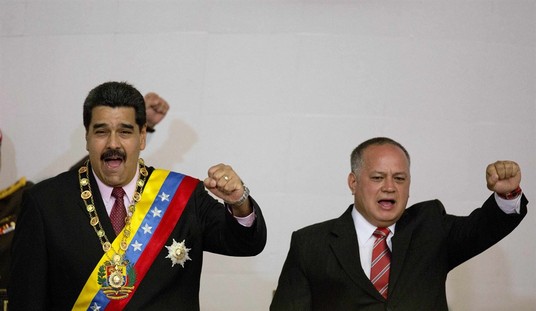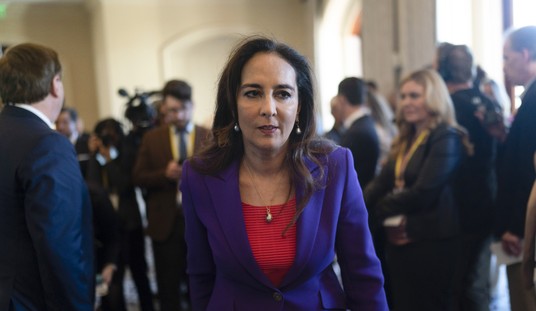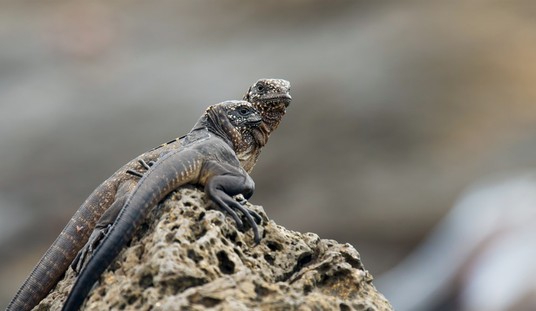I woke up on 9/11 the way millions of others did, with the phone call to turn on the television — with an urgency that told you it didn’t really matter which channel. And the first words out of my mouth after clicking the remote were probably the first words millions of other people said: “Oh my God.” Only, of course, there was nothing godly about it, no matter what the perpetrators might have thought.
 Ten years and a multifront war later, perspective become more possible, if still imperfect. I don’t care to rehash the day of the attack. My viewpoint was too remote to still matter to anyone but myself. If you want reminiscence, look elsewhere. There’s plenty to be found, especially in the blogosphere.
Ten years and a multifront war later, perspective become more possible, if still imperfect. I don’t care to rehash the day of the attack. My viewpoint was too remote to still matter to anyone but myself. If you want reminiscence, look elsewhere. There’s plenty to be found, especially in the blogosphere.
What I do want to do today is take a brief look at ten years of war. After the shock of 9/11 wore off, resolve set in. Left, right, conservative, liberal, moderate, everyone said the same two words: “Never again.” So, as former New York Mayor Ed Koch used to ask, “How’m I doin’?”
The liberal conceit in the Global War on Islamic Terror was twofold and intertwined. There was the belief that the attacks that morning were somehow our fault, and that it wasn’t an act of war. Those notions have twin effects in collapsing our ability to fight . The first one treats our enemy as somehow less than adult, not fully responsible for waging a war against civilians. The second saps our national will and our cultural confidence. This is the real homefront, and it’s the one front where, if we aren’t quite losing, we certainly aren’t winning.
The conservative (and neocon) error was also twofold.
 First, we overestimated the enemy’s capability for a sustained campaign. That is, in the days and weeks after 9/11, we waited for the other shoe to drop. The attack on the World Trade Center was perfectly and viciously choreographed. It led us to believe, perhaps instinctively, that al-Qaeda must have other equally terrifying shocks in store.
First, we overestimated the enemy’s capability for a sustained campaign. That is, in the days and weeks after 9/11, we waited for the other shoe to drop. The attack on the World Trade Center was perfectly and viciously choreographed. It led us to believe, perhaps instinctively, that al-Qaeda must have other equally terrifying shocks in store.
That turned out to be far from the case. Terrorists have the advantage of surprise, but they lack the resources for more than one or two at a time. Two months after 9/11, even as al-Qaeda’s protectors in Afghanistan were being routed in an impromptu special forces campaign, Osama bin Laden was powerless. We rolled up al-Qaeda’s base of operations, and al-Qaeda could do nothing to stop us and little even to punish us. When bin Laden finally mustered another large-scale attack, it was against Spain, not the United States.
As I put it at the time, losing Spain to an accommodationist government was the equivalent of losing Norway to the Nazis — inconvenient, but hardly vital. And that’s the best al-Qaeda has managed in the ten years following its most brilliant and brutal attack.
Our second error was also one of overestimation: We overestimated our ability to improve the political culture of the Arab world. We were right to insist — while the left stuck its fingers in its ears and shouted “nanananananananana I can’t hear you” — that 9/11 was due to the failure of the Arab world to cope with modernity. Terrorists aren’t created by poverty or by the Middle East’s history of oppression by the West. The 9/11 attackers were mostly the sons of Saudi Arabia’s upper-middle class. And the West’s colonial experience in the Middle East lasted less than 50 years — and America was never a colonial power there.
No. The Arab world’s corrupt leadership had combined with Islam’s innate susceptibility to violence and scapegoating to produce modern terrorism. Getting bootstrap support from the USSR fifty years ago also introduced modern weaponry and propaganda techniques into the hostile brew. Lovely.
 We stepped into this mess in Iraq, intentions pure and hopes aflutter that as soon as we stepped in, the Iraqis would step up. Needless to say, that didn’t happen. But President Bush did at least persevere and pursue a second goal of turning Iraq into a deathtrap for jihadis. We’ll never know exactly how many of the killers we killed, but estimates run from 40,000 to 80,000. Better to fight then over there with soldiers, than over here with airplane passengers.
We stepped into this mess in Iraq, intentions pure and hopes aflutter that as soon as we stepped in, the Iraqis would step up. Needless to say, that didn’t happen. But President Bush did at least persevere and pursue a second goal of turning Iraq into a deathtrap for jihadis. We’ll never know exactly how many of the killers we killed, but estimates run from 40,000 to 80,000. Better to fight then over there with soldiers, than over here with airplane passengers.
Even so, it was a very close-run thing, as shattered neocon dreams emboldened the Left to try and destroy a president and lose a war.
Imagine instead that Bush had actually waged the war in accordance with his own (correct) formulation of the Axis of Evil. The major sponsors of state terror were North Korea (chiefly as an arms merchant), Iraq, and Iran — and Iran’s junior partners, Syria and various Palestinian groups. North Korea, as a non-ideological foe, could be safely isolated by taking away its customers. Israel can — and mostly does — keep the Palestinian problem a local one.
As for the rest? An ultimatum, mid-2002, after ejecting the Taliban, to turn over all records, funds, and materials related to terror. If not, a long, rapid march from the beaches of Syria to the streets of Tehran, destroying all government buildings — and any military forces stupid enough to stand in the way. Then get our soldiers back on their ships in the Persian Gulf, with the stern message: “Don’t make us come back here again.”
Would it have worked?
 Who knows — but the troops would have been home by Christmas, their casualties in the hundreds not thousands, and we’d be a trillion or two dollars richer. And I’d wager that whoever was left in power in the Middle East, they’d be much less likely to indulge their terrorist fantasies.
Who knows — but the troops would have been home by Christmas, their casualties in the hundreds not thousands, and we’d be a trillion or two dollars richer. And I’d wager that whoever was left in power in the Middle East, they’d be much less likely to indulge their terrorist fantasies.
Instead, we’ve wound down to an exhausted finish in Iraq while we engage in never-ending nation-building in Afghanistan. We’re so exhausted that now even a punitive expedition, smaller than the one I’ve just described, might be discredited before it began.
Mistakes aside, we are safer than we were on 9/10/2001. The cost — in blood and treasure and national will — has been higher than it should have been. But our soldiers, sailors, airmen, and Marines have fought with uncommon valor, from the hills of Afghanistan to the streets of Baghdad, and even to a walled compound just outside of Islamabad. Our intelligence services have fought the secret war, with a chilling effectiveness. We should also remember that our civilians have fought in this war, too. They first launched a hasty spoiling attack against their captors on Flight 93, and have since disarmed the “shoe bomber” and others.
It’s a tribute to all of them, on every front, that we can spend some time this morning looking back with a cool eye, rather than spending the entire day in maudlin remembrance. There’s a place for that. There’s a place for this, too. We’re lucky to still have both.










Join the conversation as a VIP Member